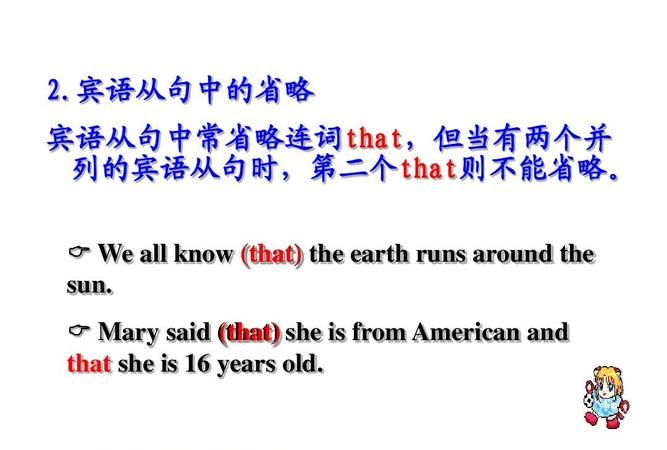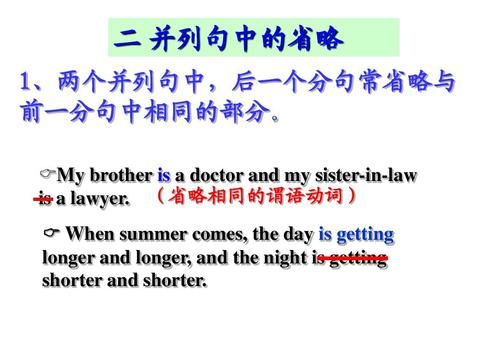本文目录
英语省略句的用法归纳
英语省略句的用法和种类
导语:省略句用在哪里才合适?有几种省略句?下面是我整理的英语省略句的用法和种类,欢迎参考!

一、并列复合句中的省略
在并列句中后边的分句可以省略与前边分句中相同的成分。如:
a) The boy picked up a coin in the road and (the boy ) handed it to a policeman. 这个男孩在马路上拾起一枚硬币并把他交给了警察。
b) Your advice made me happy but(your advice made) Tom angry .你的建议使我高兴但使汤姆生气。
c) Tom must have been playing basketball and Mary (must have been)doing her homework. 汤姆肯定一直在打篮球,玛丽一直在写作业。
d) Gao Xiumin was born in 1959 and Fu Biao (was born) in 1963.高秀敏出生于1959年,傅彪出生于1963年。
二、主从复合句中的省略
1.状语从句中的省略
一般说来省略现象多出现在下列五种状语从句中:1)由 when ,while ,as ,before, after , till, until, once等引导的时间状语从句;2)由whether ,if , unless 等引导的条件状语从句;3)由though , although ,even if ,whatever等引导的让步状语从句;4)由 as ,than 等引导的比较状语从句;5)由as, as if , as though 等引导的方式状语从句。上述状语从句在省略时应遵循下面原则:
1) 当状语从句的主语与主句的主语一致时,可以省略状语从句的主语和系动词be,这时从句中可出现如下结构:(1) 连词(as, as if , once)+ 名词; (2) 连词( though, whether , when)+形容词;(3) 连词(whether, as if ,while )+介词短语;(4) 连词(when , while , though )+ 现在分词; (5) 连词(when ,if ,even if ,unless ,once ,until, than , as ) + 过去分词; (6) 连词(as if ,as though ) + 不定式。如:
a) Once (he was)a worker ,Pang Long now becomes a famous singer .庞龙曾经是个工 人,现在变成一位著名的歌手。
b) Work hard when (you are) young ,or you'll regret.趁年轻要努力学习,要不然你会后悔的。
c) He looked everywhere as if (he was)in search of something .他到处看似乎在找什么东西。
d) While (he was) holding talks with President Hu Jintao ,US President George W. Bush thanked China for its important role in the Six-Party Talks.
e) The exhibition is more interesting than (it was) expected .这次展览比被预料的有趣的多。
f) Olympic gold medallist hurdler Liu Xiang opened his lips as if (he were) to speak。奥林匹克金牌获得者跨栏运动员刘翔张开嘴好像要说什么。
注意:
1) 当从句的主语和主句的宾语一致时,间或也有这样的省略,如:
Her father told her to be careful when (she was)crossing the street.当她过马路时父亲告诉她要当心。
2) 当从句的主语是 it,谓语动词中又含有系动词be 时,可以把it和系动词be一起省略。此时构成连词(if , unless ,when , whenever)+形容词的结构。如:
Unless (it is) necessary ,you'd better not refer to the dictionary.如果没有必要,你最好不要查字典。
2.定语从句中的省略
1) 一般说来,在限制性定语从句中,作宾语的关系代词 that ,which , whom 可以省略;如:
Is this reason (that) he explained at the meeting for his carelessness in his work?这就是他在会上解释他工作中粗心的原因吗?(2002上海春季)
而在非限制性定语从句中作宾语的关系代词 which , whom 不可以省略。试比较:
Tom (whom) you saw yesterday fell ill.( whom可以省) 你昨天见到的汤姆病倒了。
Tom , whom you saw yesterday ,fell ill. ( whom不可以省) 汤姆病倒了,你昨天见到他了。
2)在口语和非正式用语中,关系副词when ,where , 和 why 经常用that 来代替,甚至还可省略。如:
a) This is the first time (when/that)he had trouble with the boss.这是他第一次麻烦老板。
b) He wants to find a good place (where/that) we can have a picnic during the “golden week ”holiday .他想找一个能在黄金周期间野餐的好地方。
c) Could you tell us the reason (why/that)he was so unhappy ? 你能告诉我们他为什么如此不高兴吗?
3)当先行词为表示方式的 the way 时 ,从句不能用 how 来引导 ,应该用that 或 in which ,或将它们全部省略。如:
I don't like the way (that/in which) you laugh at her.我不喜欢你嘲笑他的行为。
3.宾语从句中的省略
1)在及物动词后面所接的宾语从句中,连词that 一般可以省略;但如果及物动词后面是由that引导的两个或两个以上的并列的宾语从句 ,那么只有第一个that可以省略。如:
a) I think (that) the reform of the renminbi's exchange rate is necessary. 我认为人民币兑换率的改革是必要的。
b) He said (that)the Anti-secession law had been passed and that President Hu Jintao had signed a presidential order
2)由 which , when ,where , how,和 why 引导的 宾语从句,可以全部或部分省略。如:
a) I know that NBA star Yao Ming will come to our city but I don't know when (he will come to our city).我知道NBA明星要到我们城市来但我不知道他什么时候来。
b) He wants to move abroad but his parents wonders why (he wants to move abroad)他想搬迁到国外但他的父母想知道为什么。
4.在与suggest ,request ,order ,advise 等词相关的名词性从句中,须用虚拟语气形式“should +动词原形”,should可以省略。如:
Chirac, President of the Republic of France suggested that the China-France Culture Year (should) last long in various forms.法国总统希拉克建议中法文化年以各种各样的形式长期持续。
5.主句省略多用于句首。如:
(It is a ) Pity that I didn't go to Mary's birthday party yesterday.很遗憾,我昨天没有去参加玛丽的生日聚会。
6.在答语中,主句可全部省略。如:
—Why were you absent from school last Friday ?—(I was absent from school)Because my mother was ill. —上周五你为什么没有上学? —因为我妈妈病了。
三、简单句中的省略
1.省略主语
1)祈使句中的主语通常被省略 如:
(You) Open the door, please. 请开一下门。
2) 其它省略主语多限于现成的说法 如:
a) (I) Thank you for your help 谢谢你的帮助。
b) (It)Doesn't matter.没关系。
2.省略主谓语或主谓语的一部分 如:
a) (There is) No smoking. 禁止抽烟
b) (Is there)anything else ? 还有其他事吗 ?
c) (You come)This way please.请这边走。
d) (Will you) Have a smoke ? 抽烟吗 ?
3.省略宾语 如:
—Do you know Mr. Li ? 你认识李先生吗?— I don't know (him.) 我不认识他
4.省略表语 如:
—Are you thirsty ? 你30岁了吗? Yes , I am (thirsty). 是的,我是。
5.同时省略几个成分 如:
a) —Are you feeling better now? 你觉得好些了吗 ?—(I am feeling ) Much better (now) 好多了。
b) (I wish) Good luck (to you) .祝你好运/祝你顺利。
四、动词不定式省略,只保留to 的场合
1.不定式作某些动词的宾语时,这些动词常见的'有:love, like, care, wish, hope, expect, prefer, refuse, mean , try , oblige , advise , persuade , agree , want , afford , forget , remember , try , manage等。如:
a)— You should have thanked her before you left . —I meant to ,but when I was leaving I couldn't find her anywhere.—你本该在离开前谢谢她。—我本打算这么做,但当我就要离开的时候我却找不到她了。(2000上海春)
b) You can do it this way if you like to .如果你想做,你可以这么做。
2.不定式作某些动词的宾语补足语或主语补足语时,这些动词常见的有:ask , tell ,advise, force, persuade, wish, allow, permit , forbid ,expect, order ,warn 等。如 :
a) The boy wanted to ride his bicycle in the street ,but his mother told him not to. 男孩想在街上骑他的自行车,但他母亲不让。(NMET1995)
b) She wants to come but her parents won't allow her to (come). 她想来,可是她父母不让。
3.不定式在句中作某些形容词的状语时,常见的形容词有:happy, glad ,eager , anxious , willing , ready 等。如:
— I will be away on a business trip .Could you mind looking after my cat ? — Not at all.I would be happy to (look after your cat). —我要出差,你能帮我照顾一下我的猫吗?—没关系,我很愿意。
4.不定式作某些复合谓语时,常见结构如:be able to, be going to, have to, ought to, used to等。如:
He doesn't like fish but he used to 他现在不喜欢吃鱼,但过去喜欢。
五、动词不定式to 的省略
1.主语部分有to do ,系动词 is 或 was 时 ,作表语的不定式通常省去to。如:
The only thing you have to do is press the button.你必须做的惟一事情是按按钮。
2.作介词but ,expect ,besides 的宾语,前面又有实意动词 do时,不定式通常省去to. 如:
3.主语部分暗含to do,表语中的不定式通常省去to。如:
All I want (to do) is go to school and study hard .我想要(做)的就是上学,努力学习。
4.当两个或多个不定式并列时,其后的不定式符号可以省略,但有对比关系时不可省略。如:
It is easier to say than to do . 说起来容易,做起来难。
5.在would rather…than… 等结构中,不定式符号常常要省略. 如:
I would rather stay at home than go to see a film.我宁愿呆在家也不愿去看电影。
6.在see ,watch ,notice ,hear, listen to ,look at ,feel ,have, make, let ,observe 等词后作宾语补足语时省略不定式符号to;why (not) do 结构 中, 不定式不带to。如:
a) I saw her enter the room. 我看见她进入了房间
b) Why not join us ?为什么不加入到我们的行列里来呢?
六.其他一些省略结构
1.名词所有格修饰的名词,若表示住宅、店铺、教堂或上下文已暗示或明确指出过的事物时,常常可以省略。如:
We spent the weekend at the Mary's. 我们在玛丽家过的周末。
2.What和 how引导的感叹句中,常可省略主语 it 和be动词 如:
a) What a wonderful victory (it is ) for Tom ! 这对Tom来说是个多么大的胜利呀!
b) How beautiful (it is ) to be treated like a normal child. 被当作一个正常孩子对待对他而言是多么美妙的一件事呀。
;高中英语语法省略句思维导图
省略句其实不用作为一项专题来讲解,
因为在英语中省略无处不在,在讲到具体的语法点时,比如讲到时间状语从句时,带着讲一下时间状语从句的省略就行了。
也就是只能在具体的语法点里,如果有省略的用法就带着讲一下,等语法点讲的差不多了,省略的用法也就基本上都带到了,这时再来简单总结一下即可,毕竟省略不是重点。

英语中的省略句是什么意思
省略句是英语的一种习惯用法.按照语法的分析,句子应该具备的成分,有时出于修辞上的需要,在句中并不出现,这种句子叫做省略句1.简单句中的省略:
在对话中,交谈双方都知道谈论的对象,则可以省略句子的主语,省略主语和谓语的现象在交际用语中出现的很多.
(1)Looks like rain.
(2)Hope to hear from you soon.
(3)Sounds like a good idea.
(4)Beg your pardon.
(5)Feeling better today
(6)This way,please.
(7)—What does he want to eat
—Some rice and vegetables.
(8)Anything I can do for you
(9)Sorry to hear that.
(10)Doesn’t matter.
(11)Terrible weather!
(12)Pity you couldn’t come.
2.并列句中的省略:
在并列句中,相同的成分如主语,谓语,宾语等都可以省略:
(1)They learn French and we English.
(2)My father planned and built all these houses.
(3)John won the first race and Jimmy the second.
(4)Coral is not a plant but a variety of animal life.
3.复合句中的省略:
定语从句:
(1)That’s the reason he is late for the conference.
(2)I don’t like the way he talks.
状语从句:
(1)If heated,water will boil.
(2)Tom was attacked by cramp while swimming across the river.
(3)We’ll go to help you if necessary.
(4)Had I time,I would come.
(5)I’ll go,should it be necessary.
(6)The captain can find a boat quicker than we can.
宾语从句:如果宾语从句中的谓语部分与主句的谓语部分或上文的谓语部分相同,可将从句部分的谓语省略.
(1)We will do what we can(do)to help you.
(2)—Is Mr.King in his office?
—Sorry,I don’t know(whether he is in his office or not).
4.动词不定式的省略:在动词不定式结构中,为了避免重复,常常省略不定式结构中的动词原形,只保留to.
(1)—Would you like to go with us
—I’m glad to,but I have to finish my homework.
(2)Don’t tell me the name of the sailor if you don’t want to.
(3)—Have you ever been to the seaside?
—No,we can’t afford to.
在used to,ought to,have to,would like/love to,wish to,be going to等结构中,常常省略to后面的动词原形.
(1)They do not visit their parents as much as they ought to.
(2)He doesn’t get up early as he used to.
(3)I’ll hand it in if I have to.
(4)—Would you like to come tonight
—I’d love to.
Tell ,warn ,order ,advise ,ask等动词的宾语后面接动词不定式做宾语补足语时,可以省略to后面的动词原形.
(1)He wanted to swim across the river but I warned him not to.
(2)The boy wanted to play football in the street,but his mother told him not to.

高考英语省略句的用法
英语中为了避免重复,往往省去一个词语或更多成分,这种语法现象称为省略。省略的情况复杂、多样,综合近年来的高考题,常在以下几个方面对省略进行考查。
一、 考查状语从句中的省略
例1. When first ______to the market, theseproducts enjoyed great success. (2004高考)
A. introducing B.introduced C.introduce D.being introduced
2._____with the size of the whole earth, the biggest ocean does notseem big at all. (2004湖北)
A. Compare B.When comparing C. Comparing D.Whencompared
3.The research is so designed thatonce nothing can be done to change it. (2002年全国)
A. begins B. havingbegun C. beginning D.begun
Key:1.B 2.D 3.D
简析 状语从句中,如果主句的主语和从句的主语一致,且状语从句的谓语动词中有be动词,从句的主语连同be可一起省略,该类状语从句多为时间、地点、条件、方式或让步等,连词为when,while, though, if, unless, although, as if等,后面通常接分词、不定式、形容词、名词等。
例 Look out for cars when (you are) crossingthe street.
另外,在when /if it is necessary , possible 结构中, it is通常省略。
例 Drop in on me if (it is ) possible.
二、 考查定语从句中关系代词及关系副词的省略
例.1.That’s an unpleasant thing to say aboutyour father after _______ he’s done for you. (2004高考)
A. something B. anything C. all D.that
2. Playing tricks on others is ______we should never do.(2004湖南)
A. anything B.something C.everything D.nothing
3. What surprised me was not what he said but ___he said it. (2004湖北)
A. the way B. in the waythat C. in the way D. the way which
Key: 1.C 2.B 3.A
简析 关系代词在限制性定语从句中充当宾语且不位于介词之后可以省略;关系副词 that在先行词reason/ way后的省略。
例 This is the reason why / for which / that/省略he was late. (that 为关系副词,可省略)
三、不定式符号to 的省略
例:1.A computer does only what thinking people _________.(1999上海)
A. have it do B. have itdone C. havedone it D.having it done
2. We’ve missed the last bus. I’m afraid we have no choice but_____ a taxi. (1993上海)
A. to take B.taking C. take D.taken
Key: 1.A 2.A
简析:不定式在感官动词see, hear, feel, watch, notice, look at , listento, overhear, observe 和使役动词 have, make, let 后作宾语补足语时,不定式省略to。
例 I watched him disappear in the distance.
不定式符号to在介词but ,except, besides后的省略。介词but ,except,besides 后接不定式作宾语时,介词前有行为动词do,不定式要省去to。
例We did nothing but/except wait then.
不定式符号to作表语时的省略。当主语部分有行为动词do,作表语的不定式to可省略。
例What I want to do now is find some books to read.
四、考查不定式后动词的省略
例: 1.--- Would you like to go to the Great Theatre with metonight.
--- ______.(1999上海高考)
A. Yes, I would like to go to the Great Theater with youtonight.
B. I’d love to, but I have an exam tomorrow.
C. No, I wouldn’t D.That’s all right
2.--- Does your brother intend to studyGermany?
--- Yes, heintends ________. (1998上海高考)
A./ B.to C.so D.that
3.--- I’ll be away on a business trip. Wouldyou mind looking after my car?
--- Not atall. ________. (1995NMET)
A. I’ve no time B. I’d rathernot C. I’d likeit D. I’d behappy to
Key: 1.B 2.B 3.D
简析 动词love, mean, want, hate, like, wish,expect, hope,try, intend, plan, refuse, prefer, seem 及be glad(pleased, delighted, happy) to等后面接不定式时,为避免重复,常省略与上文相同的动词,只保留to不定式符号。
例--- How about going for a walk ?
--- I’d like to ( go for a walk ) .
句式would have done …, should have done…, ought to have done…,needn’t have done …, used to be …等省略形式为 would have ,should have , ought to have, needn’t have , used to be,要保留不定式后的be或have。
例 ---Are you a sailor ?
--- No, but I used to be (a sailor).
五、对替代词so 及not 的考查
1. --- You haven’t lost the ticket, have you?
--- ______.I know it’s not easy to get another one at the moment.(2004江苏高考)
A. I hopenot B. Yes, Ihave C. I hope so D. Yes, I’m afraidso
2. --- The boys are not doing a good job at all,are they ?
--- ________.(2003北京春)
A. I guess notso B. I don’t guess C. I don’t guessso D. I guessnot
3.--- I believe we’ve met somewhere before.
--- No, ________. (2000北京春)
A. it isn’t the same B. it can’t be true C. I don’t think so D. I’d rather not
Key: 1.A 2.D 3.C
简析 替代词so /not用于避免重复前面所说过的内容,代替肯定的名词性从句。可与动词believe, do, expect, fear, guess, hope, say, speak, suppose, think 等及I’m afraid连用。肯定时上列动词都可与so 搭配,否定时hope与guess只用I hope not 和I guess not 形式,而think ,believe , suppose等词可有两种否定形式 ,即:I think not 或I don’t think so.
例 --- Is he going to studyabroad?
--- I believe so. ( so = he is going to study abroad)
六、 考查虚拟语气中if 及should 的省略
1._____ it rain tomorrow, we would have to putoff the visit to the Yangpu Bridge. ( 1994上海 )
A. Were B. Should C. Would D.Will
2.What would have happened _______ as far as the river bank ?(2001上海高考)
A. Bob hadwalkedfarther B. if Bobshould walk farther
C. had Bobwalkedfarther D. if Bobwalked farther
3.Jane’s pale face suggested that she _____ill, and her parents suggested that she ___ a medical examination.( 1994上海高考)
A. be,should have B. was,have C. should be, had D. was,has
4.____be sent to work there ? (2002上海高考)
A. Who do you suggest B.Who do you suggest that should
C. Do you suggest whoshould D. Do yousuggest
Key: 1.B 2.C 3.B 4.A
简析 在书面语中,当条件从句有were, had, should 时省略if , 把它们提至句首,形成倒装句式。
在含有建议、要求、命令等相关的名词性从句用should + V ,should可以省略。
例 He suggested that she (should ) go atonce.
注suggest表示“暗示” 时用陈述语气
七、 会话中的省略
例: 1.---Guess what ! I came across an old friend at the party lastnight.
--- ______. I’m sure you had a wonderful time. (2004辽宁)
A. Soundsgood! B. Very well C. How nice ! D. All right!
2.--- Let’s go and have a good drink tonight.
--- _____ Have you got the first prize in the competition?(2004重庆)
A. What for ? B. Thanks alot . C. Yes, I’d liketo D. Why not?
3. ---Brad was Jane’sbrother!
--- _____ he reminded me so much of Jane ! (2004浙江)
A. No doubt B. Above all C. No wonder D. Of course
4. If you are planning to spend your moneyhaving fun this week, better ____ it —— you’ve got some bigbills coming. (2004广东高考)
A. forget B.forgot C. forgetting D. toforget
Key: 1.C 2.A 3.C 4.A
简析 省略在会话中广泛应用,解题时应按照问话或答语的具体内容补充完整,做好该类题型一是要注意上下文语境,二是要注意常见句式的省略。英语中常见句式的省略有:
1.It is … (that…) 强调句式中that部分省略。 2.(It is) No wonder … ( 难怪…)
3.(Is there) Anything else ?
4.(You’d) Better do
5.have some difficulty( in) doing, prevent sb (from) doing sth等词组中介词在口语中常省略
例: 1.--- Where did you see him last night?
--- It was in the hotel ____ he stayed.
A. where B.that C.which D. /
2. You can’t imagine the great difficulty I had _____ yourhouse.
A. finding B.found C. tofind D. find
key 1.A 2.A
简析 第1题可以补全强调句式that 部分: It was inthe hotel where he stayed that I saw him last night. hotel后为定语从句。
第2题是对have difficulty in doing sth词组置于定语从句的考查,介词in 的省略加大了该题的难度。
高考链接
1. --- Go for a picnic this weekend, OK?
--- ______. I love getting close to nature. (2004福建)
A. I couldn’t agreemore B. I’m afraid not
C. I believenot D. I don’t think so
2. --- Susan, will you please go and empty that drawer ?
--- _______? (2004 全国I 卷)
A. Whatfor B. What is it
C. How isit D. How come
3. It is easy to do the repair. ________ you need is a hammer andsome nails. (2004天津高考)
A.Something B. All
C.Both D. Everything
4. Unless ______ to speak, you should remain silent at theconference. (2003年上海春季高考)
A.invited B. inviting
C. beinginvited D. having invited
5. The man we followed suddenly stopped and looked as if____whether he was going in the right direction.(2003年北京春季)
A.seeing B. having seen
C. to haveseen D. to see
6. Though ______ money, his parents managed to send him touniversity. (2002 年上海高考)
A.lacked B. lacking of
C.lacking D. lacked in
7. When ______, the museum will be open to the public next year.(2002年 上海春季高考)
A.completed B. completing
C. beingcompleted D. to be completed
8. He made another wonderful discovery, ____ of great importance toscience. ( 1998上海高考)
A. which I think is B. which Ithink it is
C. which I thinkit D. I thinkis
9. If ________ the same treatment again, he is sure to get well.(1998年上海高考)
A.giving B.give
C.given D. beinggiven
10. --- Alice, why didn't you come yesterday?
---I ________, but I had an unexpected visitor. (1997NMET)
A.had B. would
C. was goingto D.did
Key: 1-5.AABAA 6-10. CAACC
综上所述,高考对省略的考查主要对状语从句中的省略、不定式的省略、否定问句的省略回答、虚拟条件句中if的省略及比较级的省略的考查。只有掌握了常见的省略现象及其考查形式,才能以不变应万变,在高考中立于不败之地。

以上就是关于高中英语省略句作用,英语省略句的用法归纳的全部内容,以及高中英语省略句作用 的相关内容,希望能够帮到您。
